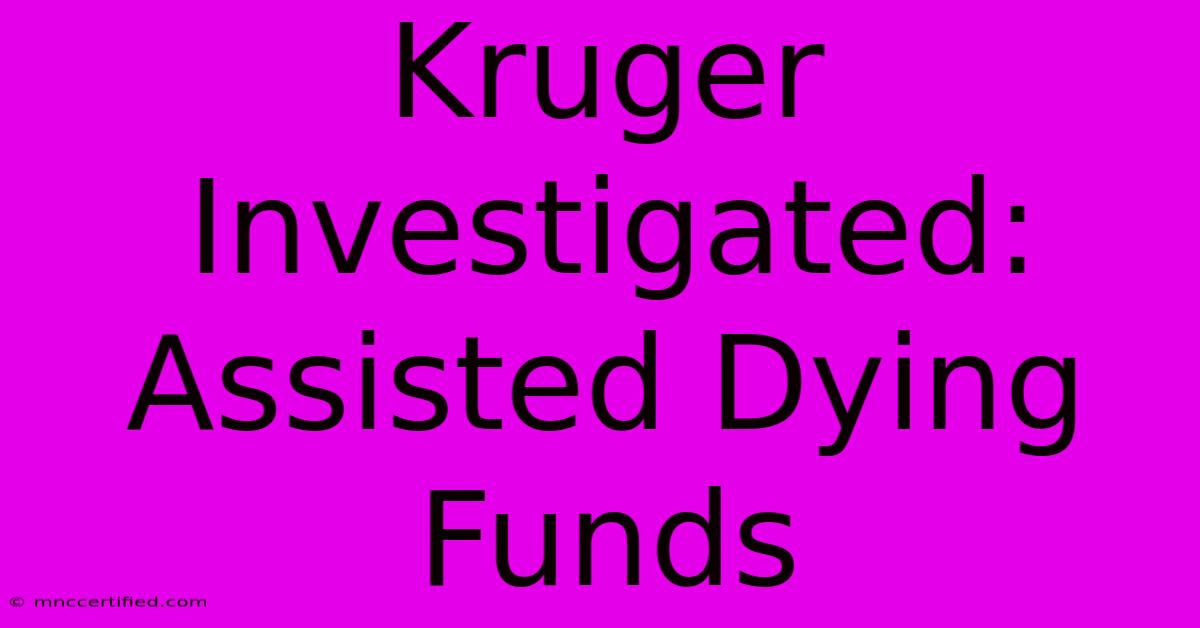Kruger Investigated: Assisted Dying Funds

Table of Contents
Kruger Investigated: Unraveling the Mystery Surrounding Assisted Dying Funds
The recent investigation into the finances surrounding the Kruger assisted dying case has sparked intense public debate and raised serious questions about transparency and accountability within the assisted dying sector. This article delves into the complexities of the investigation, exploring the key issues, potential implications, and the broader ethical considerations surrounding the funding of assisted dying.
Understanding the Kruger Case
The Kruger case, while specific in its details, highlights a broader concern: the financial transparency and ethical considerations involved in providing assisted dying services. The investigation focuses on potential irregularities in the handling of funds intended to support individuals seeking assisted dying, raising questions about whether donations were properly managed and used for their intended purpose. The specifics of the alleged financial mismanagement remain under investigation, but the implications are significant.
Key Questions Raised by the Investigation
The investigation into the Kruger case has brought several crucial questions to the forefront:
- Were funds properly accounted for? This is a central question, focusing on the accuracy and completeness of financial records related to the assisted dying services provided. A lack of transparency in this area fuels public distrust and undermines the credibility of organizations involved.
- Were funds used for their intended purpose? It's crucial to ensure that donations specifically designated for assisting individuals with end-of-life choices were not diverted to other purposes. Any misallocation of funds would be a serious breach of trust and a potential legal violation.
- What are the oversight mechanisms in place? The investigation highlights the need for robust regulatory frameworks and oversight mechanisms to ensure the responsible management of funds within the assisted dying sector. Stronger oversight could help prevent future instances of financial impropriety.
- What are the ethical implications of funding assisted dying? This broader question delves into the philosophical and moral considerations surrounding the financial aspects of assisted dying. Debates around funding models, donor motivations, and the potential for conflicts of interest need careful consideration.
The Importance of Transparency and Accountability
The investigation emphasizes the critical importance of transparency and accountability in all aspects of assisted dying services. Openness regarding funding sources, expenditure, and management practices builds public trust and ensures ethical conduct. Robust auditing procedures and independent oversight are essential to maintain the integrity of the process. Lack of transparency can lead to public skepticism and erode confidence in organizations providing these sensitive services.
The Broader Context: Ethical Considerations and Future Implications
The Kruger case serves as a stark reminder of the need for careful consideration of the ethical, legal, and financial implications surrounding assisted dying. The investigation’s outcome will likely influence future policies and regulations regarding funding and oversight within this complex area. It is vital to establish clear guidelines and standards to ensure the ethical and responsible management of funds intended to support individuals seeking assisted dying.
Moving Forward: Recommendations for Reform
Moving forward, several recommendations can be implemented to improve transparency and accountability within the assisted dying sector:
- Strengthened regulatory frameworks: Implementing stricter regulations and oversight mechanisms to monitor financial practices within organizations providing assisted dying services.
- Independent audits: Mandating regular independent audits of financial records to ensure accuracy and compliance with regulations.
- Public reporting requirements: Establishing clear requirements for organizations to publicly report their financial information in a transparent and accessible manner.
- Ethical guidelines for fundraising: Developing clear ethical guidelines for fundraising related to assisted dying, addressing potential conflicts of interest and ensuring donor intent is respected.
The Kruger investigation is a pivotal moment in the ongoing conversation about assisted dying. By addressing the issues raised, we can work towards creating a system that is both compassionate and ethically sound, ensuring the dignity and respect of those seeking end-of-life options. Further investigation and open public discussion are crucial to building a transparent and accountable future for assisted dying services.

Thank you for visiting our website wich cover about Kruger Investigated: Assisted Dying Funds. We hope the information provided has been useful to you. Feel free to contact us if you have any questions or need further assistance. See you next time and dont miss to bookmark.
Featured Posts
-
Slater Family Halts Fundraising
Nov 29, 2024
-
Walmart And Bhg Top 6 Home Scents
Nov 29, 2024
-
Giants Week 13 Drew Lock To Start
Nov 29, 2024
-
Zoom Travel Insurance Reviews
Nov 29, 2024
-
Car Insurance For Chevy Cruze
Nov 29, 2024